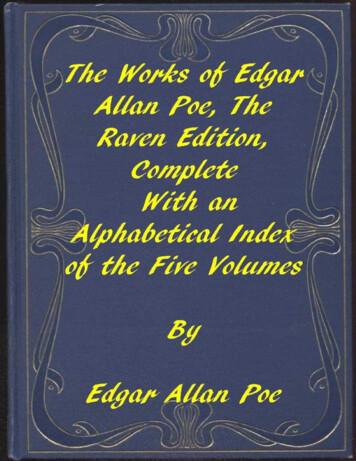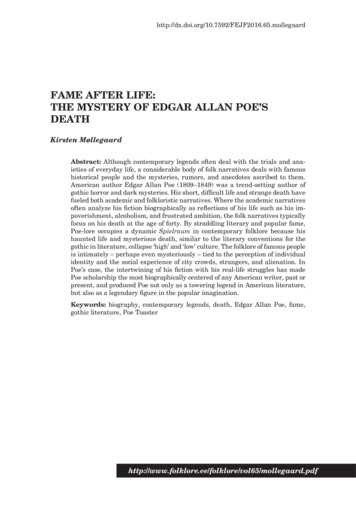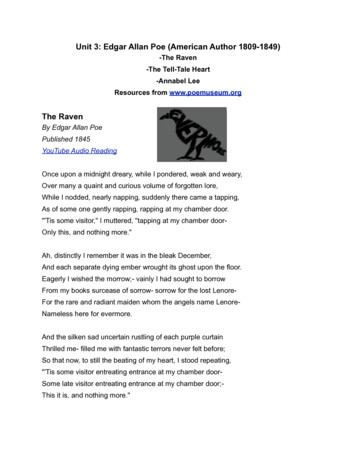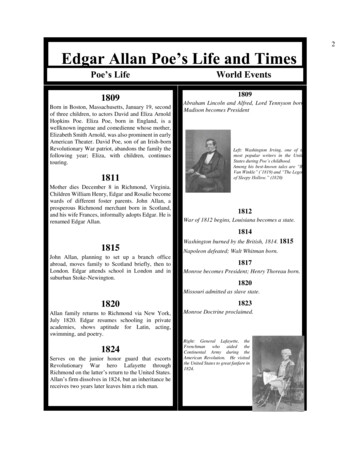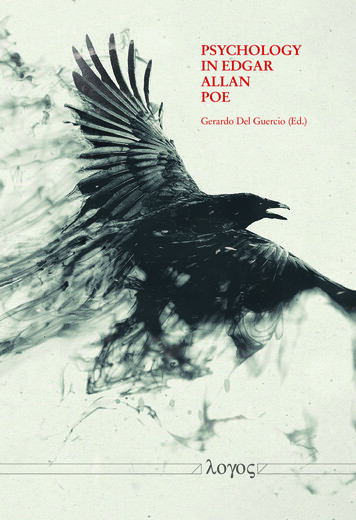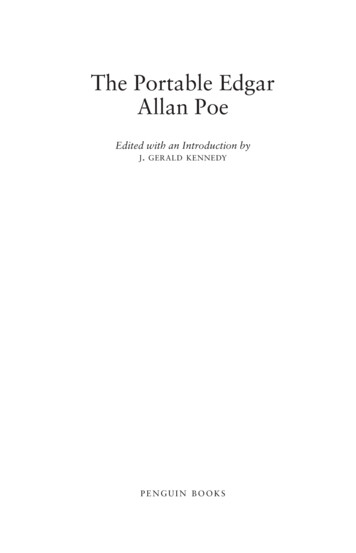
Transcription
The Portable EdgarAllan PoeEdited with an Introduction byJ . GERALD KENNEDYPENGUIN BOOKS
penguinclassicsT H E P O RTA B L E E D G A R A L L A N P O Eedgar allan poe was born in Boston on January 19, 1809, theson of itinerant actors. Orphaned in 1811, he became the ward ofJohn and Frances Allan of Richmond, accompanying them to England in 1815 and then returning in 1820 to Richmond, where hecompleted his early schooling. In 1826 he attended the University ofVirginia, but gambling debts forced his withdrawal, and after a clashwith his foster father, Poe left Richmond for Boston. There in 1827he published his first book of poetry, Tamerlane and Other Poems,and enlisted in the U.S. Army as “Edgar A. Perry.” After tours ofduty in South Carolina and Virginia, he resigned as sergeant-major,and between two later books of poetry—Al Aaraaf, Tamerlane, andMinor Poems (1829) and Poems (1831)—he briefly attended the U.S.Military Academy. Court-martialed and expelled, he took refuge inBaltimore with his aunt, Maria Clemm, and there began to composefantastic tales for newspapers and magazines; in 1835 he obtained aposition in Richmond at the Southern Literary Messenger. Perhapsalready secretly wedded to his thirteen-year-old cousin, VirginiaClemm, he married her publicly in 1836. At the Messenger Poegained notoriety by writing savage reviews, but he also raised thejournal’s literary quality and enhanced both its circulation and reputation. In 1837, however, economic hard times and alcoholic lapsescost Poe his job; he moved to New York, where he completed a novel,The Narrative of Arthur Gordon Pym, published in 1838. By then,Poe had relocated to Philadelphia, where he wrote “Ligeia” as well as“The Fall of the House of Usher” and “William Wilson.” Duringsuccessive editorial stints at Burton’s Gentleman’s Magazine andGraham’s Magazine, Poe developed plans to establish a high-qualitymonthly periodical. He also published his first book, a volume titledTales of the Grotesque and Arabesque (1840), and later producedthe first modern detective story, “The Murders in the Rue Morgue,”as well as the prize-winning cryptographic tale, “The Gold-Bug.” In1842 his wife suffered a hemorrhage that marked the onset of tuberculosis. Poe returned to New York in 1844 and reached the peak ofhis productivity, publishing such tales as “The Premature Burial” and“The Purloined Letter.” He gained fame in 1845 with his poem “TheRaven,” and that year also saw the publication of two books: Talesand The Raven and Other Poems. But the weekly literary newspaper
he had managed to acquire, The Broadway Review, collapsed at thebeginning of 1846. Moving to nearby Fordham, Poe continued towrite and to care for Virginia until her untimely death in 1847. In hisfinal years, he composed the sweeping, cosmological prose-poem,Eureka (1848), as well as some of his most renowned poetry, including “The Bells,” “Eldorado,” and “Annabel Lee.” After a ruinousbout of election-day drinking, Edgar Allan Poe died in Baltimore onOctober 7, 1849.j. gerald kennedy is William A. Read Professor of English atLouisiana State University and a past president of the Poe Studies Association. He earned his doctoral degree at Duke University, where hewas elected to Phi Beta Kappa. His books on Poe include Poe, Death,and the Life of Writing (1987) and “The Narrative of Arthur Gordon Pym” and the Abyss of Interpretation (1995), as well as two edited collections of essays, A Historical Guide to Edgar Allan Poe(2001) and (with Liliane Weissberg) Romancing the Shadow: Poeand Race (2001). In an early book titled The Astonished Traveler:William Darby, Frontier Traveler and Man of Letters (1981), he reconstructed the career of a prolific antebellum geographer and magazinist. Kennedy’s work on literary modernism includes ImaginingParis: Exile, Writing, and American Identity (1993) and two editedcollections, Modern American Short Story Sequences (1995) and(with Jackson R. Bryer) French Connections: Hemingway and Fitzgerald Abroad (1998). He has served many years on the board of theErnest Hemingway Foundation. Fellowships from the John SimonGuggenheim Foundation, the National Endowment for the Humanities, and the Louisiana Board of Regents have supported work on anexpansive study of national destiny and the cultural conflicts thatvitiated American literary nation-building, 1820–1850.
The Portable EdgarAllan PoeEdited with an Introduction byJ . GERALD KENNEDYPENGUIN BOOKS
penguin booksPublished by Penguin GroupPenguin Group (USA) Inc., 375 Hudson Street, New York, New York 10014, U.S.A.Penguin Group (Canada), 90 Eglinton Avenue East, Suite 700, Toronto, Ontario, Canada M4P 2Y3(a division of Pearson Penguin Canada Inc.)Penguin Books Ltd, 80 Strand, London WC2R 0RL, EnglandPenguin Ireland, 25 St Stephen’s Green, Dublin 2, Ireland (a division of Penguin Books Ltd)Penguin Group (Australia), 250 Camberwell Road, Camberwell, Victoria 3124, Australia(a division of Pearson Australia Group Pty Ltd)Penguin Books India Pvt Ltd, 11 Community Centre, Panchsheel Park, New Delhi – 110 017, IndiaPenguin Group (NZ), cnr Airborne and Rosedale Roads, Albany, Auckland 1310, New Zealand(a division of Pearson New Zealand Ltd)Penguin Books (South Africa) (Pty) Ltd, 24 Strudee Avenue, Rosebank, Johannesburg 2196, South AfricaPenguin Books Ltd, Registred Offices:80 Strand, London WC2R 0RL, EnglandThis edition first published in Penguin Books 2006Copyright Penguin Group (USA) Inc., 2006All rights reservedISBN: 1-4362-9509-2CIP data availableSet in SabonThe scanning, uploading and distribution of this book via the Internet or via any other meanswithout the permission of the publisher is illegal and punishable by law. Please purchase onlyauthorized electronic editions, and do not participate in or encourage electronic piracyof copyrighted materials. Your support of the author’s rights is appreciated.
ContentsIntroduction by J. Gerald KennedyChronologyA Note on TextsixxxxixxxviiTA LES1PredicamentsMS. Found in a BottleA Descent into the MaelströmThe Masque of the Red DeathThe Pit and the PendulumThe Premature BurialThe Facts in the Case of M. Valdemar7112137435771BereavementsThe AssignationBereniceMorellaLigeiaThe Fall of the House of UsherEleonoraThe Oval teinWilliam WilsonThe Tell-Tale Heart155159168187v
vicontentsThe Black CatThe Imp of the PerverseThe Cask of AmontilladoHop-Frog192202208215MysteriesThe Man of the CrowdThe Murders in the Rue MorgueThe Gold-BugThe Oblong BoxA Tale of the Ragged MountainsThe Purloined Letter225229238271306317327GrotesqueriesThe Man That Was Used UpThe System of Doctor Tarr and Professor FetherSome Words with a Mummy345349359377POEMSThe Lake—To ——Sonnet—To ScienceFairy-LandIntroduction“Alone”To HelenThe SleeperIsrafelThe Valley of UnrestThe City in the SeaLenoreSonnet—SilenceDream-LandThe RavenUlalume—A BalladThe BellsA Dream within a 426430434
viicontentsFor AnnieEldoradoTo My MotherAnnabel Lee435439440441LETT ERSTo John Allan, March 19, 1827To John Allan, December 22, 1828To John Allan, January 3, 1831To John Allan, April 12, 1833To Thomas W. White, April 30, 1835To Maria and Virginia Clemm, August 29, 1835To Philip P. Cooke, September 21, 1839To William E. Burton, June 1, 1840To Joseph Evans Snodgrass, April 1, 1841To Frederick W. Thomas, June 26, 1841To Frederick W. Thomas, February 3, 1842To T. H. Chivers, September 27, 1842To Frederick W. Thomas and Jesse E. Dow,March 16, 1843To James Russell Lowell, March 30, 1844To Maria Clemm, April 7, 1844To James Russell Lowell, July 2, 1844To Evert A. Duyckinck, November 13, 1845To Virginia Poe, June 12, 1846To Philip P. Cooke, August 9, 1846To N. P. Willis, December 30, 1846To Marie L. Shew, January 29, 1847To George W . Eveleth, January 4, 1848To George W. Eveleth, February 29, 1848To Sarah Helen Whitman, October 1, 1848To Annie L. Richmond, November 16, 1848To Frederick W. Thomas, February 14, 1849To Maria Clemm, July 7, 1849To Maria Clemm, September 18, 85488491492493496498499503506512516519520
viiicontentsCRITICA L PRI NCIPLESOn Unity of EffectOn Plot in NarrativeOn the Prose TaleOn the Design of FictionThe Object of Poetry (from “Letter to B——”)“The Philosophy of Composition”The Effect of Rhyme“The Poetic Principle” (excerpts)American CriticismOBSERVATIONSLiterary Nationalism“Some Secrets of the Magazine Prison-House”American Literary IndependenceThe Soul and the SelfImagination and InsightPoetical IrritabilityGenius and Proportionate IntellectReason and GovernmentAdaptation and the Plots of GodWorks of GeniusNational Literature and ImitationLanguage and ThoughtMagazine Literature in AmericaThe Name of the NationThe Unwritable BookImaginationArt and the SoulSuperiority and SufferingMatter, Spirit, and Divine WillNotesSelected 05611623
IntroductionAn alien presence in the first generation of professional Americanauthors, Edgar Allan Poe has fascinated generations of readersaround the world while perplexing scholars. From the outset heoverturned expectations and flouted conventions. The selfproclaimed need to “conquer or die—succeed or be disgraced”drove Poe to stretch the boundaries of literary representation.When an editor scolded him in 1835 for the disgusting particularsof an early tale, he coolly enumerated the narrative modes he meantto exploit: “the ludicrous heightened into the grotesque; the fearful colored into the horrible; the witty exaggerated into the burlesque; the singular wrought out into the strange and mystical.”Committing himself to an extreme art sometimes approaching“the very verge of bad taste,” Poe aimed to achieve celebrity byshocking the public. “To be appreciated, you must be read,” he insisted, justifying his tactics. While magazines and gift books purveyed sentimentalized images of death, he conjured subversivescenes of dissolution, dismemberment, and decomposition; his poems and tales defined a twilight zone of primal anxiety and endless melancholy. Dismissing a charge that he emulated the Germanromantics, Poe hinted at the origins of his own creativity whenhe observed in 1840 that “terror is not of Germany, but of thesoul.” He rejected the assurance of contemporary religionists,making the condition of dread—and a corollary yearning fortranscendence—his trademark as a writer. But he also mockedboth Gothic terror and Transcendentalism.Poe’s paradoxical trafficking in corporeality and spirituality, invulgarity and sublimity, in banal humor and mortal seriousness mayhave something to do with his wide appeal as well as his resistanceto facile categorization. His compulsion to astonish or perplex ledix
xintroductionhim to overturn familiar assumptions, as when his detective C.Auguste Dupin observes: “Truth is not always in a well. In fact, asregards the more important knowledge, I do believe that she is invariably superficial.” Reversing the conventional logic of surfacedepth relations, Poe suggests that the deepest truths are neitherremote nor esoteric but instead obscured only by their immediacy.He vaunted his skill as a cryptographer and celebrated mentalanalysis in “tales of ratiocination,” yet he also parodied the investigative impulse and—in his only novel, The Narrative of ArthurGordon Pym—caricatured scientific observation as self-delusion.He cloaked his uncertainties about the fate of the soul in farcesthat travestied human mortality, representing characters who survive hangings, beheadings, and premature burials. He developed atheory of fiction in which effect trumps moral enlightenment—hecalled didacticism a “heresy”—and contrived nightmarish “tales ofsensation.” But he also satirized literary sensationalism and devisedmoral fables about pride and profligacy. Poe famously declared thedeath of a beautiful woman to be “the most poetical topic in theworld,” yet in several tales he made her demise the horrifying “soulof the plot.” His penchant for mystification, for constructing hoaxesto dupe the reading public and assert his intellectual superiority perhaps compensated for grinding poverty and social obscurity.In an era of rampant optimism about his country’s future, Poelampooned democracy as mob rule and refuted “human perfectibility” as well as the allied belief that civilization and progressculminated in the United States. Opposing literary nationalism, hescoffed at the tendency to overpraise “stupid” books because theywere American, yet he quietly began to produce American taleshimself in the 1840s. In temperament Poe embodied multiple contradictions, among which his compulsion to sabotage his ownschemes for personal and professional advancement seems ultimately the most intriguing. He did not write about “the spirit ofperverseness” by chance but rather struggled against its pullthroughout his short, unhappy life. Brilliantly inventive yet contrarily at odds with himself, Poesprang from modest origins. Born in Boston in 1809, he was the
i n t ro du c t i o nxison of itinerant stage performers who left him an orphan beforehis third birthday. His father, the sodden David Poe, had abandoned the family and presumably died in Norfolk in 1811 justas tuberculosis (or “consumption”) claimed Edgar’s mother, theEnglish-born actress Elizabeth Arnold Poe, in Richmond. Hermiddle child became the ward of a dour Richmond merchant,John Allan, and his wife, Frances, while baby Rosalie came underthe care of the Mackenzie family and his older brother, WilliamHenry Leonard, went to live with grandparents in Baltimore. Significantly, although the Allans spoiled Edgar during his childhood,they declined to adopt him. As a small boy he accompanied themon vacations to White Sulphur Springs and on visits to plantationsnear Richmond; he probably played with slave children at Allan’scountry estate on Buffalo Creek. A precocious lad, he reportedlycould read a newspaper at five, although his formal schoolingcommenced the following year. In 1815, he sailed with the Allansto England, where after visiting relatives in Scotland, John Allanopened a London branch of the mercantile firm he owned withCharles Ellis. The boy known as “Edgar Allan” attended boardingschool first with the Misses Dubourg in Chelsea and then at Reverend Bransby’s Manor House School in Stoke Newington. Hisstudies included Latin and French, and his experiences at the latterinstitution inspired details of English school life in one of his latertales, “William Wilson.” In 1819 Poe spent two months in Scotland; his travel there and about the English countryside providedthose glimpses of ancient castles, abbeys, country houses, andcathedrals that long after his return to America recurred in dreamand memory as the Old World of his childhood.Financial reverses in 1820 compelled John Allan’s return toRichmond, where his ward resumed the name Edgar Allan Poe inthe city where Eliza Poe was buried. At Joseph H. Clarke’s academy the boy studied mathematics and geography, excelling inLatin and Greek; he also revealed a gift for verse satire, collectinghis clever poems in a portfolio that he begged Allan to publish. Hisfoster father pondered the request and consulted the schoolmasterbut finally refused, wishing not to excite authorial vanity. WhenClarke left in 1822, Poe entered the school of William Burke,where he was instructed in French as well as the classical languages. In adolescence, he became adventurous and mischievous,
xiiintroductionan “imperious” lad whose enthusiasm for pranks sometimes provoked Allan. Poe enjoyed sports, loved to box, and challengedschoolmates to long-jumping contests or swimming competitions.Though slight in stature, he was combative and scornful; classmates declined his leadership. His friends nevertheless includedEbenezer Burling, Robert Cabell, and Robert Stanard.At fourteen Poe turned to Jane Stith Stanard, the mother of hiscompanion, for emotional comfort and understanding, later idealizing her in his poem “To Helen” after her sudden derangementand untimely death in 1824. Her loss intensified his own recklessimpulsiveness: Not long afterward, he swam six miles in the JamesRiver against an incoming tide under a scorching sun to prove hisindomitability. Hints of estrangement from his foster father lurk inAllan’s comment of 1824 that Poe “does nothing & seems quitemiserable, sulky, and ill-tempered to all the family.” His lack of“affection” and “gratitude” galled Allan in light of the “care andkindness” he allegedly received. Poe fell into line—literally—whenGeneral Lafayette visited Richmond in 1824 during his Americantour; the boy paraded with the junior militia that formed an honorguard for the Revolutionary hero who had known his late grandfather, Major David Poe of Baltimore. But the moodiness Allannoted was soon exacerbated by emerging romantic interests. Forseveral years Poe had scribbled poems to local girls, and most hadbeen bantering in tone until he met Sarah Elmira Royster in thesummer of 1825. She lived opposite Moldavia, the Richmondmansion John Allan had bought that year with a huge inheritanceleft by an uncle, and she later recalled Poe as a “beautiful boy”with a “sad” manner who occasionally came calling with verses inhand. The two developed a mutual fondness, spoke of marriage,and remained close until Poe left Richmond to enroll in the University of Virginia early the following year.Classes at Mr. Jefferson’s university brought Poe in contact withsome of the great minds of the young republic. The author of theDeclaration was (until his death on July 4 of that year) very muchan intellectual presence in Charlottesville, where he shaped the curriculum; the faculty included former presidents Madison and Monroe, who examined Poe in Latin and Greek. But the students werea brawling, hot-tempered lot who sometimes settled personal differences by dueling, and Poe (lacking sufficient funds from Allan)
i n t ro du c t i o nxiiitook to gambling and drinking. He also wrote poems, concoctedstories, and covered the walls of his room with charcoal sketches; aclassmate described him as “excitable & restless, at times wayward, melancholic, and morose.” Examinations intimidated him,but he performed well, excelling in “ancient languages” andFrench. By the end of the year, however, Poe was in deep trouble:summoned to testify about student gambling, he denied involvement but privately begged Allan to cover his losses. In late December, Allan journeyed to Charlottesville, settled the debts he deemedlegitimate, withdrew Poe from the university, and hauled him backto Richmond in disgrace. To complete the debacle, Poe soonlearned that Miss Royster’s father, having intercepted Poe’s loveletters, had compelled her to break the engagement.A fateful clash with Allan soon ensued. Condemned to disciplinary toil in the office of Ellis and Allan, Poe accused his foster father of heartlessly “exposing” his youthful indiscretions and thusblasting his hopes for “eminence in public life.” Packing his bagsand leaving Moldavia, he demanded funds to journey north toearn enough money to resume his university studies, and a fewdays later embarked on a perilous new life. In Baltimore he apparently visited his brother, and then he traveled on to Boston, wherehe assumed an alias to dodge creditors from Virginia.In the city of his birth, Poe led a dire, hand-to-mouth existence,working first as a clerk in a mercantile store, then briefly as a market reporter for a struggling newspaper, and in May he enlisted inthe army as “Edgar A. Perry.” Through relocation and travail Poehad continued to write poetry, and during the summer he found apublisher willing to print his little volume, Tamerlane and OtherPoems, ascribed to “a Bostonian.” Recasting oriental legend, theexotic title poem showed the influence of Byron as Poe concocteda thinly disguised version of the cruelties that had separated himfrom Miss Royster. But the book received little notice. Reassignedto duty at Fort Moultrie, Poe in November boarded a brig boundfor South Carolina, where he arrived eleven days later after nearlyperishing in a gale off Cape Cod.On desolate Sullivan’s Island, Poe became an artificer, maintaining the cannons and small artillery at the fort. He staved off boredom by writing verse and reading Shakespeare as well as otherEnglish poets; he also developed literary contacts in nearby
xivintroductionCharleston, where he perhaps met writer-editor William GilmoreSimms. Military life proved irksome, however, and Poe contrivedto shorten his five-year enlistment; when his unit was reassigned toFortress Monroe, Virginia, in December 1828, he begged Allan toarrange his release even as he accused him of utter neglect. Abouthis outsized ambition Poe defiantly boasted, “The world shall bemy theatre.” A promotion to regimental sergeant-major, however,apparently inspired a different plan: While still seeking the discharge, he asked Allan to enquire about an appointment to themilitary academy at West Point. But in early 1829, just as Poe wasrefining this scheme, another blow fell: He learned that his fostermother, the sickly Frances Allan, had died of a lingering illness.Poe reached Richmond too late to attend Mrs. Allan’s burial,but he achieved a temporary truce with Allan, who replenishedPoe’s wardrobe and on his behalf contacted several men of political influence. After hiring a replacement and securing a militaryrelease on April 15, Poe carried letters from Allan to Washingtonand then traveled on to Baltimore, there conferring with formerRichmond acquaintance William Wirt, the U.S. attorney general,who assessed his poetry and offered cautionary advice. Undaunted, Poe tracked down publishers and editors, submitting hispoems to periodicals and negotiating publication of a new volumeof verse. He pursued his appointment to West Point while living incheap hotels or lodging with impoverished relatives. In late 1829,a Baltimore publisher issued Al Aaraaf, Tamerlane, and Minor Poems, attributed to “Edgar A. Poe.” With a touch of drama Poe declared himself “irrecoverably a poet,” savoring a favorable reviewfrom the irascible New England critic John Neal.By 1830 Poe had secured a place in the entering class at WestPoint. Initially he flourished at the academy; his scholastic effortsearned commendations in mathematics and French, and he playedoccasional pranks while regaling classmates with clandestine“doggerel” about cadet life. But again he lacked adequate funds tomeet living expenses. When Allan journeyed to New York City inOctober to remarry, he departed without contacting his foster son,and then refused further communication with him, the cadetgrasped that he had been permanently disowned. Without an allowance or inheritance, Poe knew that he could never properly sustain himself as an officer, and resentment of Allan provoked his
i n t ro du c t i o nxvsubsequent drinking and neglect of duty. He later claimed that hehad no love of “dissipation” but had been victimized by Allan’s“parsimony.” After several weeks of missed roll calls, parades, andinspections, Poe faced a court-martial and was dismissed from theacademy on February 18, 1831. But appreciative of Poe’s literarytalents, the cadets subsidized the New York publication of Poemsby Edgar A. Poe, which included “To Helen” and “Israfel.”Sick and discouraged, Poe lingered in New York for severalweeks, but finding no work he returned to Baltimore, residing withhis grandmother, his aunt Maria Clemm, and her daughter Virginia. Poe also rejoined his older brother, Henry, a poet and formersailor then in the last stages of tuberculosis. Surrounded by illnessand poverty, Poe replied to an announcement in a Philadelphianewspaper of a hundred-dollar premium for the “best Americantale” by composing that summer and fall a handful of clever narratives set in the Old World, mostly satirical imitations of magazinefiction—a Gothic tale of revenge, a pseudobiblical farce, a spoofabout the indignities of dying, and two separate fantasies about menbargaining with the devil for their souls. Poe reinvented himself asa magazinist under depressing circumstances: His brother died inAugust, and soon thereafter a cholera epidemic gripped Baltimore.That fall poor health and abject poverty impelled Poe’s penitentappeal to John Allan in which he acknowledged his “flagrantingratitude”—an apology that Allan, then celebrating the birth of alegitimate male heir, rewarded with monetary assistance.The new year brought some encouragement: Although Poe didnot win the coveted literary prize, the Saturday Courier in January1832 published his first prose tale, “Metzengerstein,” and fourother stories subsequently appeared in print, perhaps bringing hima few dollars. In the same playful, parodic vein, Poe added severalnew tales to his portfolio and in August showed them to LambertWilmer, a Baltimore writer and editor. Still unable to find regularemployment, though, Poe apparently tried his hand as a schoolteacher, an editorial assistant, and a manual laborer at a brick kiln.He also began tutoring his young cousin, Virginia, a girl of sweetlysentimental temperament to whom he became emotionally attached. By May 1833 his accumulating cache of stories—now conceived as “Tales of the Arabesque” told by members of a literaryclub—numbered eleven, and in June, when the Baltimore Saturday
xviintroductionVisiter announced prizes of fifty dollars in both fiction and poetry,Poe submitted six new pieces from a collection he rechristened“Tales of the Folio Club.” The selection committee found itself“wholly unprepared” for their wild novelty and selected “MS.Found in a Bottle” for the prize in fiction. Through this competition Poe met two influential men of letters, J. H. B. Latrobe andJohn Pendleton Kennedy, and in November, Kennedy himself delivered Poe’s manuscript collection to publisher Henry C. Carey inPhiladelphia. One of Poe’s best “Folio Club” tales, a piece later titled “The Assignation,” soon appeared in Godey’s Lady’s Book,the first large-circulation periodical to feature his work.A lawyer and novelist, Kennedy also became a mentor: He hiredPoe to do odd jobs, gave professional advice, furnished new clothes,and provided occasional meals. He encouraged the younger writerto send his work to Thomas W. White, a Richmond editor whohad just launched the Southern Literary Messenger. Poe needed afresh start: John Allan’s death in March 1834 had ended any possibility of reconciliation, and his will contained no mention of hisimpoverished former ward. Moreover, despite Kennedy’s intervention, Carey seemed politely reluctant to publish the “Folio Club”tales. How Poe sustained himself during this period remains unclear; by 1835 his appearance was so “humiliating” that he declined a dinner invitation from Kennedy. But an important literaryconnection was already in the making: Poe’s shocking new tale,“Berenice,” had appeared in the March issue of the Messenger.Though chastened by White about the story’s grisly finale, Poesupplied another mystical tale, “Morella,” for the April issue,along with several critical notices. By May he was a regular contributor, and by June he was advising White about promotionalstrategies. Two months later he ventured to Richmond, ostensiblyto pursue a teaching position but actually to negotiate employment with White. Arriving in Richmond—and curiously affectedby his separation from Mrs. Clemm and Virginia—Poe becameoverwhelmed by a paralyzing melancholy and sought respite indrink. The dubious White judged Poe “rather dissipated” uponarrival and chose to hire him “not as Editor” but as an untitledassistant.With a new job and an annual salary of 520, Poe nevertheless
i n t ro du c t i o nxviisuffered from depression, and in late August contemplated suicide. Within a month he bolted from the Messenger office, returning to Baltimore perhaps to wed his cousin in secret and certainlyto beg her and Mrs. Clemm to join him in Richmond. He thenasked White for reinstatement, which the editor reluctantlygranted. With his aunt and cousin installed in Richmond, Poethrew himself into the task of making the Messenger a leading national periodical. He did so less by featuring his own tales andpoems—which in 1836 consisted mostly of reprinted pieces—than by begging contributions from respected authors, elicitingfavorable notices of the Messenger in other publications, andcomposing pungent critical notices. He gradually expanded thejournal’s circulation—though not so greatly as he later claimed.Defiantly he attacked the “misapplied patriotism” of nationalisticcritics “puffing” inferior books by American authors. He alsoperformed journalistic stunts, concocting an exposé about a chessplaying automaton as well as a pseudoscientific exercise in handwriting analysis. In May, perhaps to quash local rumors, hepublicly married his cousin (then not quite fourteen) before ahandful of witnesses that included his employer. Although Whiterecognized his assistant’s brilliance, he nevertheless refused toname him the editor, struggled to restrain Poe’s literary attacks,and deplored his recurrent insobriety.Meanwhile, Poe renewed his efforts to publish his “Folio Club”tales, approaching Harper & Brothers in New York throughJames Kirke Paulding; when the Harpers declined the volume, advising Poe to write a novel instead, he offered the collection—without avail—to Philadelphia and London publishers. But he alsobegan an American novel about a Nantucket youth who revoltsagainst his family by going to sea in quest of romantic adventures.The opening chapters of The Narrative of Arthur Gordon Pym appeared in the Messenger in early 1837, just as White, beset by financial woes and exasperated by Poe’s instability, dismissed hismercurial assistant.An outcast once more, Poe
THE PORTABLE EDGAR ALLAN POE edgar allan poe was born in Boston on January 19, 1809, the son of itinerant actors. Orphaned in 1811, he became the ward of John and Frances Allan of Richmond, accompanying them to En-gland in 1815 and then returning in 1820 to Richmond, where he completed h


